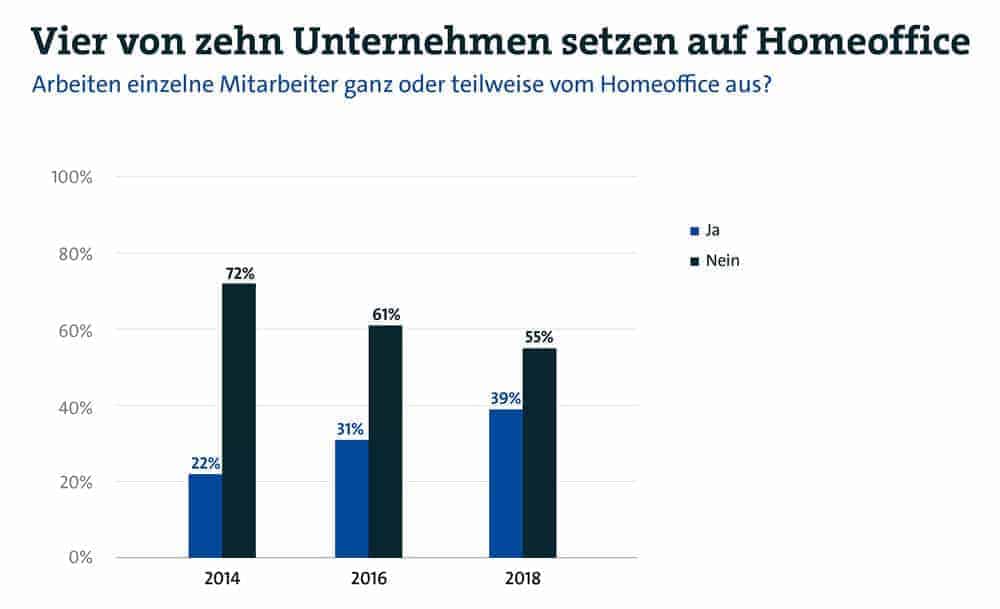Four out of ten companies rely on home office


Four out of ten employers (39%) give their employees the freedom to work away from the traditional office space. This is the result of a survey commissioned by the digital association Bitkom.
855 managing directors and HR managers from companies with three or more employees were surveyed on the topic of working from home. The questions range from general information ("How many employees in your company currently work from home, either fully or partially, as a percentage?") to more detailed information ("Which of the following statements apply to how your company deals with the topic of working from home?").
In 2016, almost one in three companies (30 percent) allowed employees to work from home, compared to just one in five (20 percent) in 2014. This trend is expected to continue. 46% of companies assume that the proportion of their employees working from home will increase over the next five years. 50 percent expect the proportion to remain constant.
"Digital technologies make it possible to work independently of time and place. Working from home is becoming part of everyday life for more and more employees"
says Bitkom CEO Bernhard Rohleder.
This makes it all the more important to set clear boundaries: For many employers, working from home is precisely regulated. Three out of four companies (74%) whose employees work from home have set certain days on which working from home is not permitted so that all employees are available for joint appointments such as meetings.
Six out of ten (61 percent) make being in the office the rule and working from home the exception, for example just one day a week.
In almost every second company (46 percent), working from home must be approved by the line manager on a case-by-case basis.

Reasons against working from home
"Flexible working from home requires clear rules. It requires trust on the part of the company and self-organization and self-discipline on the part of the employees"
says Bernhard Rohleder. But the strictest rules are not always enough to allay employers' concerns.
This is why many companies decide against working from home. But other factors also play a role. Two thirds of companies whose employees do not work from home state that working from home is not possible for all employees and that no one should be treated unequally.
More than half (58%) believe that productivity decreases without direct communication with colleagues. And almost just as many (55%) say that working from home is generally not an option. For just over one in three companies, the fact that employees are not available at all times (33%) is an argument against flexible working from home.
Just under three in ten say that working hours cannot be controlled (29%). For one in four companies (27 percent), the legal regulations on occupational health and safety speak against working from home.
Other reasons include concerns about data security (22 percent), technical equipment that is too expensive (16 percent) and the fear that employees will identify less with the company (9 percent).
Antiquated labor law is a home office hurdle
Even though more and more companies are opting to work from home or at least familiarizing themselves with it, not everyone is ready yet - not even the legal situation. The antiquated labor law is one of the biggest hurdles to the acceptance of working from home.
This is why Bitkom and other companies are committed to modernizing the legal requirements and adapting them to the digital age.
"Legal hurdles such as the rigid eight-hour working day and the eleven-hour minimum rest period stand in the way of self-determined working hours."
Rohleder also gives an example to illustrate this:
"Anyone who checks their work emails late at night and is back at work the next morning is breaking the law."
In the digital age, flexible working hours should actually be a matter of course. That is why Bernhard Rohleder is calling for it:
"Labor law is no longer up to date in these respects and puts employees in the wrong on a massive scale. It is high time to change these outdated rules."






